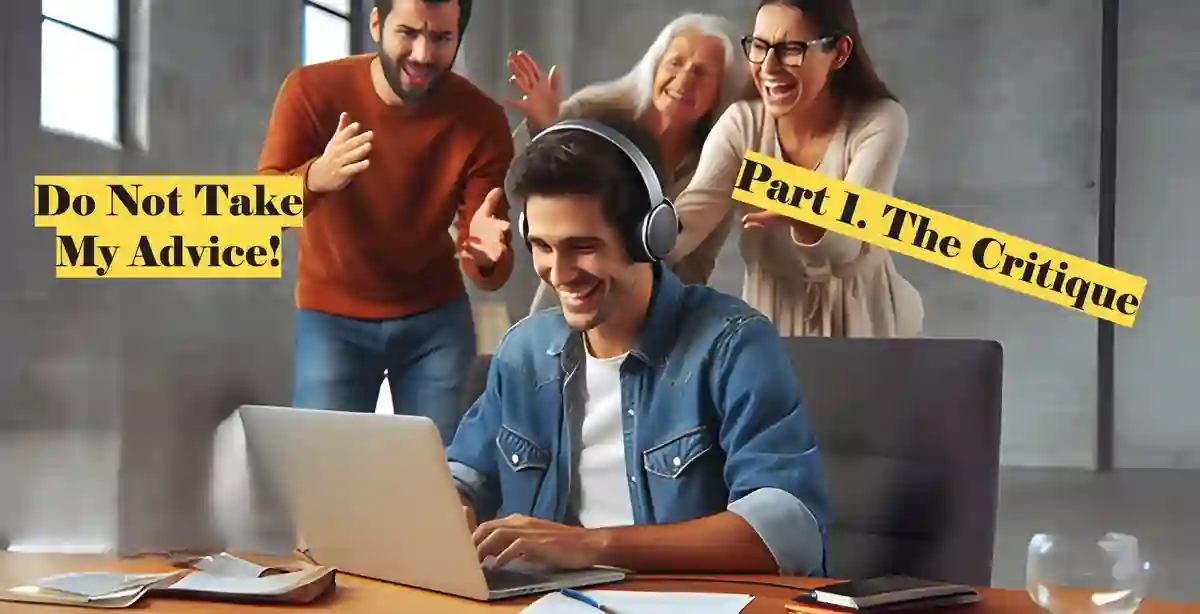My advice on writing? Do not take or give advice on writing. There is no one way to write but the way you write. You will most likely be writing differently tomorrow, anyway.
That’s my advice: take it, don’t take it, it’s all the same to me.
Aw, come on, we are all in a critique group after all
Yeah, sure, but should we be critiquing? Critiquing is a detailed analysis and assessment, and who are we to give that kind of judgment? Reading, yes. We should read it all, and we should think about it—really, think about it. But how should we talk about it?
I am the worst offender of everything I am about to preach against. I have rewritten a large section of someone’s work for them. Yup. I just said, “This is how you should write this.” Further, I thought, wow, they are going to thank me. I might get a credit or shout-out in their piece. “I am sooo brilliant,” I thought. What a putz.
In the reverse, I honestly feel my writing will be heralded and revered. People will cry and rend their garments. Some will just give up writing altogether, seeing my astounding work. Again, “I am sooo brilliant.” What a putz.
Talking about Works-In-Progress
A while back, not happy with the critiques I gave and received, I looked into critique methods in small writers’ groups. I remember a podcast with Meg Ellison about her time with Clarion West. I have tried critiquing using the rumored techniques of this preeminent speculative fiction workshop before, but now they have a published paper on their method, Help Build! Or Talking About Works In Progress by Andy Duncan. It’s only ten pages and worth the read.
Help Build! Shared version PDF
A glance at the section titled “A Few Comments Best Avoided”might make what I’m talking about clear. Here are some comments I have used more than once: “This wouldn’t happen in real life” and “Even fantasy has rules.” Those comments sink into dogmatism/arrogance (ouch, I mean it, ouch). Then there is telling an author the story isn’t theirs or telling the author what they should be doing:
Other “helpful” remarks you might have heard or said are categorized as self-absorption, anti-exposition prejudices, and negative or dismissive comments (say that ten times fast). Examples:
What if I Just Asked Some Questions and Listened For Five Minutes Instead?
I haven’t gotten there yet, and, again, I have been the worst offender of the above no-nos. But how do I change? The article suggests using a conversational approach like:
Beyond that, strive to do the next thing which is being positive, “What I really like here is…” and “I’m fascinated by the language of this story, and here are some examples.”
I have done my best to change my ways. Personally, I like to open my critiques with what I perceive as the premise of the piece. If what I think the work is about is not what the work is about, then something happened in that disconnect.

Everything comes from the premise, so stating it makes sure I, the reader, and the author are on the same page. Second, I like to state one or two things I enjoyed about the piece and what I perceive as its strengths. Third, I note where I had questions.
Writing is about making choices, and any choice is valid. But we also make mistakes that can throw a reader off the path or muddy the waters unintentionally. I like to ask what the intention was in the choice and NOT:
I think it is important to let the writer get there themselves or not get there because:
- They could get there in a more interesting way. Also, they could go forward with more confidence if they had ownership of any fixes (because they do have ownership—it’s theirs).
- Also (and this is highly unlikely because I’m sooo brilliant), I might be very, very wrong in my critique.
In Conclusion, Yup, Finally the End
So, when critiquing, here is what I’m going to try going forward:
- Restate what I believe is the premise.
- Say a couple of things I really liked.
- Ask some questions about where I might have had some difficulty.
- Ask about the author’s choices and listen.
So that is my advice. Take it or don’t take it; it’s all the same to me.

Marc is a part time chair Zumba instructor when he’s not taking life lying down. He writes because he can’t carry a tune and or carry the play, and he keeps carrying on while being too heavy to be carried off. He has no natural or unnatural rhythm. His hands are useless and his feet are worse. In his defense, however, your honor and members of the esteemed jury, he is a great guy to have a drink with.


I’ve recently had the pleasure of receiving a critique from Marc for a short story. He was true to the above ideas and offered a most useful overview and suggestions on which direction to go next. If you ever have the chance to spend an hour in his virtual company (or I suspect, IRL), I believe you will not regret it. And I recommend you re-read his post and the article he refers to as it will definitely change the way you offer your own critiques to others.
Thank you Rose.
I liked this article but you should not use Comic Sans. I would change that. It would be better.
Lol
The best critique feedback I get gives me the reader’s take on my story. If they felt a character was weak or strong, if they were unsure of the conflict, or if the pacing dragged, I want to know about that. Telling me I “can’t do” this or that is not helpful. I’m the writer, and I’ll live or die by my own decisions, thank you. Sadly, even I have told authors that “a spaceship isn’t an AI’s body,” among other harmful and discouraging comments.
That’s it really. We are readers of fellow writers, not editors or reviewers. We just have to keep that in mind and be supportive.